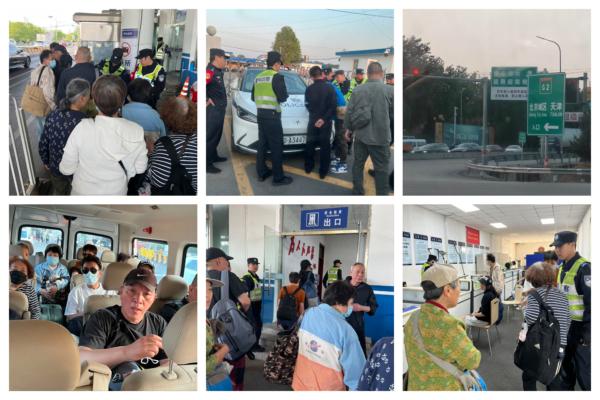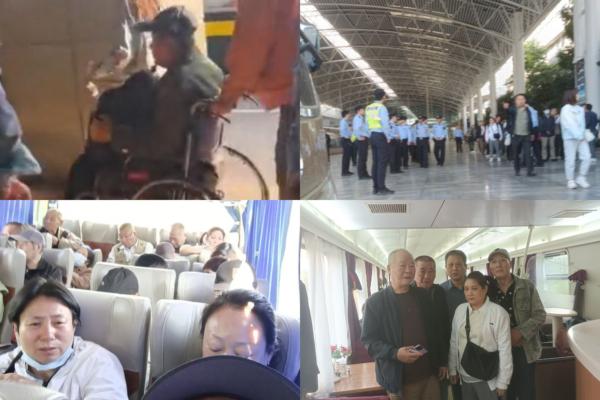Ahead of the 20th anniversary of China’s petitioning system, the Chinese Communist Party (CCP) escalated efforts to intercept petitioners arriving in Beijing.
Dozens of Chinese citizens who flocked to the Chinese capital seeking justice for a wide range of grievances over the past two weeks were rounded up or detained by police as they made their way to the central petitioning office, according to activists.
The Chinese regime set up its petition system decades ago, inviting citizens to directly address with central authorities issues or injustices caused by local officials. Numerous people from across the country travel to Beijing each year to file their petitions, especially before major political meetings or anniversaries. Petitioners believe that during these times, with more officials gathered in the capital, they have a better chance of having their grievances heard and corrected by someone in authority.
One of the latest petitioners to be targeted was Gu Guoping, a retired university lecturer from Shanghai, who was intercepted on April 27 near the central petitioning office. Gu had traveled to Beijing to submit complaints about previous unlawful detentions, alongside five other petitioners who were there to submit separate complaints.
“Our demand is for the Chinese communist government to honor international treaties, respect the human rights of Chinese citizens, and resolve long-ignored grievances from victims of rights violations,” Gu told The Epoch Times.
The Chinese regime published its Regulations on Letters and Visits (“petitioning regulations”) in January 2005, and they became effective on May 1 that year. Bureaus and offices were set up at various levels of the government as an alternative to formal Chinese legal channels, allowing Chinese nationals to seek to redress their grievances. These Chinese citizens are called “petitioners” in China.
Beijing hosts the central office for Letters and Visits, where petitioners go to file their complaints seeking justice.
Police and Checkpoints Everywhere in Beijing
Gu told The Epoch Times on April 30 that he went to the central petitioning office at about 3:40 p.m. on April 27 upon his arrival in Beijing, well before its official closing time of 5 p.m. However, he was turned away without explanation.The next day, Gu and the group gathered near Lixue Hutong, close to Zhongnanhai, the office compound that houses the CCP’s top government and party bodies.
Gu said there were many policemen near Zhongnanhai. The police stopped them, checked their IDs, and put them all on a bus that took them to Jiu Jing Zhuang, a residential compound in the southwest of Beijing. A building in the residential compound is used as a detention facility for petitioners who have come to Beijing from across the country.
Gu has been petitioning for redress in the loss of his family’s property since 2001. Gu, a university lecturer at the time, saw the homes and property of his entire extended family, spanning four households and nine people, forcibly demolished without any legal procedures. He and his family have not received either compensation or resettlement yet.
Another group of four petitioners from Shanghai took a bus to Zhongnanhai on April 28. The bus was stopped by police when it was still three stops away from the central government compound. Those passengers with big luggage or backpacks were regarded as petitioners by the police and were forcibly sent to Jiu Jing Zhuang.


On April 26, Chongqing veterans He Fanrong and Yang Ziyou were stopped at the Beijing Railway Station. They were identified as petitioners while applying for transit cards using their IDs. They were later held at the Qianmen Bus Station police post.
The Epoch Times attempted to contact He by phone after receiving SOS messages from him but was unsuccessful.
‘Black Jails’ and Psychiatric Prisons
Jiu Jing Zhuang is one of the detention centers in Beijing that keeps petitioners. An international rights advocacy group—Chinese Human Rights Defenders (CHRD)—calls such facilities illegal, as they “operate completely outside China’s judicial system” and “have no legal basis in Chinese law.”CHRD said in a 2008 report that there were at the time three such detention facilities in Fengtai, a district in the southwest of Beijing. The organization reported four more such facilities in Beijing and many more in other parts of China.
The human rights organization said that the violent interception and detention of petitioners are performed by state officials, usually “under the eyes of the police, and often with their active cooperation.” Detainees are subject to beatings and could be “held incommunicado for months without charge, trial or access to legal counsel.”
The CHRD condemns such state-sanctioned “black jails,” which have become “increasingly extensive and systematic.”
The Epoch Times is unable to verify if the facilities reported by the CHRD are still in operation. The Epoch Times reached out to Jiu Jing Zhuang and did not receive a reply by publication time.
Petitioning System ‘Massive Scam and Trap’: Petitioner
Gu condemned the CCP’s petitioning regulations as “a system designed to cover up the CCP’s lack of legitimacy” that violates “the spirit and core principles of international law and treaties.”“At its core, the petitioning system is a massive scam and trap,” he told The Epoch Times in a phone interview on April 30.
“The petitioning system forces you to return to your hometown to resolve the issue—yet the local authorities are often the very ones who created the wrongful case against you. You’re told to seek justice from your abuser. The result is the opposite of resolution. Not only are the problems left unsolved, they just keep getting worse.
“I believe the very creation of the petitioning regulations is unfair, unjust, unlawful, disconnected from public opinion and social reality, and ultimately fails to address the root problems—it is a harmful system.”







